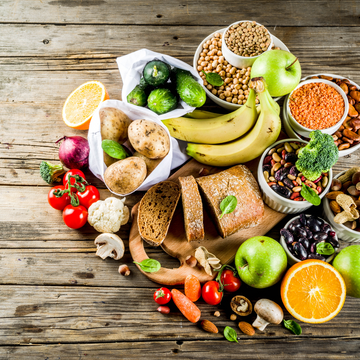Understanding the Risks of Preservatives, Additives, and Chemicals in Processed Foods
by Namita S on Feb 08, 2024

Introduction:
In today's fast-paced world, processed foods have become a convenient and often unavoidable part of many people's diets. From packaged snacks to ready-to-eat meals, these products offer convenience and shelf stability. However, what many consumers may not realize is that processed foods often contain a variety of preservatives, additives, and chemicals to enhance flavor, texture, and shelf life. In this unbiased exploration, we'll delve into the risks associated with these ingredients and offer insights into making healthier dietary choices.
What Are Preservatives, Additives, and Chemicals?
Preservatives, additives, and chemicals are substances added to processed foods to prolong shelf life, enhance flavor, improve texture, and maintain appearance. While some of these ingredients are derived from natural sources, others are synthetic compounds created in a laboratory.
Examples of preservatives, additives, and chemicals commonly found in processed foods include:
Artificial flavors and colors
Artificial sweeteners (e.g., aspartame, saccharin)
Sodium nitrite and nitrate (used in processed meats)
BHA (butylated hydroxyanisole) and BHT (butylated hydroxytoluene)
High-fructose corn syrup
MSG (monosodium glutamate)
Trans fats (partially hydrogenated oils)
Preservatives (e.g., sodium benzoate, potassium sorbate)
Artificial preservatives (e.g., propyl gallate, TBHQ)
The Risks of Preservatives, Additives, and Chemicals:
Health Concerns: Many of the preservatives, additives, and chemicals used in processed foods have been linked to adverse health effects. For example, artificial colors and flavors have been associated with behavioral issues in children, while sodium nitrite and nitrate in processed meats have been linked to an increased risk of cancer.
Allergic Reactions: Some individuals may be sensitive or allergic to certain preservatives, additives, and chemicals found in processed foods. For example, sulfites, commonly used as preservatives in dried fruits and wine, can trigger allergic reactions in sensitive individuals, including hives, difficulty breathing, and anaphylaxis.
Disruption of Gut Health: Certain additives and chemicals found in processed foods can disrupt the balance of bacteria in the gut, leading to gut dysbiosis, inflammation, and digestive issues. For example, emulsifiers such as polysorbate 80 and carboxymethylcellulose have been shown to alter gut microbiota composition and promote inflammation in animal studies.
Contribution to Chronic Disease: Regular consumption of processed foods containing preservatives, additives, and chemicals has been linked to an increased risk of chronic diseases such as obesity, type 2 diabetes, heart disease, and certain cancers. For example, trans fats, commonly found in processed foods, have been shown to raise LDL cholesterol levels and increase the risk of heart disease.
Environmental Impact: The production and disposal of preservatives, additives, and chemicals used in processed foods can hurt the environment. For example, the manufacturing process of artificial additives and preservatives often involves the use of fossil fuels and chemical solvents, contributing to air and water pollution.
Making Healthier Dietary Choices:
While it may seem challenging to avoid preservatives, additives, and chemicals entirely, there are steps you can take to minimize your exposure and make healthier dietary choices:
Choose Whole, Unprocessed Foods: Focus on incorporating whole foods into your diet, such as fruits, vegetables, whole grains, legumes, nuts, seeds, lean proteins, and healthy fats. These foods are naturally free from preservatives, additives, and chemicals and provide essential nutrients for optimal health.
Read Food Labels: When purchasing packaged foods, read the ingredient list and nutrition label carefully. Look for products with simple, recognizable ingredients and avoid those containing artificial flavors, colors, sweeteners, and preservatives.
Cook Meals at Home: Prepare homemade meals using fresh, wholesome ingredients whenever possible. Cooking at home allows you to control the quality of ingredients and avoid the additives and chemicals often found in processed foods.
Limit Processed and Packaged Foods: Minimize consumption of processed and packaged foods, particularly those high in artificial additives, preservatives, and chemicals. Instead, opt for whole, minimally processed alternatives whenever possible.
Support Transparent Brands: Choose products from brands that prioritize transparency and use natural, minimally processed ingredients in their products. Look for certifications such as organic, non-GMO, and clean labels to ensure quality and integrity.
Conclusion:
Preservatives, additives, and chemicals are commonly used in processed foods to enhance flavor, texture, and shelf life. However, these ingredients can pose risks to our health and the environment, contributing to chronic diseases and environmental degradation. By prioritizing whole, unprocessed foods and making informed dietary choices, we can minimize our exposure to these harmful substances and support our health and well-being. Let's take control of our diets and nourish our bodies with the wholesome, nutrient-rich foods they deserve.




